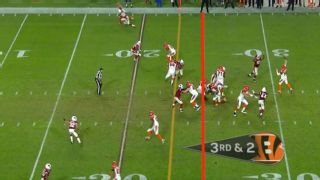|
One of the many storylines coming out of last night's back-and-forth tussle between the Bengals and Cardinals was Cincinnati's choice to throw the ball on their final offensive play from scrimmage. On third-and-2 from the Arizona 25, the Bengals, trailing 31-28, elected to pass. Andy Dalton's downfield toss intended for A.J. Green fell incomplete, stopping the clock. You could argue that the move cost Marvin Lewis' team the game. With a third-down conversion, the Bengals could have either grinded the clock down and kicked a field goal with precious few seconds remaining to set up overtime or, even better, scored a touchdown to go up by four. Instead, Cincinnati kicked a field goal to tie the game at 31 with 1:03 to go, giving the ball back to Carson Palmer, who drove the Cardinals 70 yards in 52 seconds to set up a game-winning field goal by Chandler Catanzaro. It's unfair to use hindsight and the observed outcome as the sole basis for criticizing a coaching decision, but it is fair to say that the Bengals knew this was one of the things that could happen if they threw the ball on third down. So then, why did Hue Jackson call for a bomb to Green when his offense needed just 2 yards? From what I can tell, it's because Jackson didn't call for a bomb. It looks very much like the Bengals were expecting to run the football and ended up throwing it instead. Take a look at this still image from the play, at the moment when Dalton was about to release his pass down the sideline to Green.  I've marked the line of scrimmage in bright red to make it easier to see. There are two Bengals linemen blocking downfield, including right guard Kevin Zeitler, who (illegally) barreled 3 yards upfield at the moment the ball was snapped. The three non-Green receivers on the play don't run routes; they run several yards forward at half-speed and stare at Arizona's defensive backs without turning back to even see whether Dalton wants to throw them the football. The running back, Giovani Bernard, runs toward Dalton like he's going to take a handoff. Every aspect about this play suggests that nine of the 11 Cincinnati offensive players thought it was going to be a run. Except, of course, that it ended up being a pass. It's unclear whether this was a packaged play sent out by Jackson (a concept which the Bengals do run regularly) or a look Dalton checked into at the line of scrimmage, but it's really a semantic debate. At some point, the third-and-2 run turned into a third-and-2 fade route. Dalton went from wanting a first down to wanting the game. It's easy to understand why Dalton checked out of the run play and into a pass: The Bengals had the matchup they badly wanted. The Cardinals showed a simple single-high safety look and man coverage across the board. With Patrick Peterson sidelined by an ankle injury, the Cards had reserve cornerback Justin Bethel pressing Green at the line of scrimmage. The ball was just outside the red zone, so if Dalton held deep safety Rashad Johnson for even a half-second in the middle of the field with a play-fake, there was no way he was going to get over to stop Green's go route. This is the sort of matchup Dalton dreams about at night if he dreams about A.J. Green, which he should. The flip side of the decision is even more interesting, in a way: The Cardinals baited Dalton into checking out of the run play and going for it all, knowing that they were going to be huge underdogs if Dalton hit Green for a touchdown. It speaks to the faith that Bruce Arians and rookie defensive coordinator James Bettcher have in their players that they were willing to leave their backup cornerback on an island against one of the best wideouts in football with the game on the line. That was no accident. They dared Dalton to win the game for his team. What happened, sadly for Bengals fans, is that Dalton whiffed badly on the throw. Green is 6-foot-4 and routinely snatches jump balls out of thin air; if given a fair chance against the 5-foot-11 Bethel, he should have been able to bring in what could have been the game-winning touchdown (or a pass interference penalty), especially after he easily glided past Bethel at the line of scrimmage. As you can see on the replay, Dalton didn't give his receiver a chance. Instead of leading Green or allowing him to contest a jump ball with Bethel, Dalton badly underthrew the pass. Bethel did a good job of recovering, turned at the right moment, and had the ball hit him in the hands, outside of Green's catch radius. The only reason Green ended up catching the ball out of bounds was because it bounced up and out of Bethel's grasp. Dalton was feeling heat from an unblocked Alex Okafor, who was also held on the edge by the play-fake and threat of Dalton keeping, but this was a throw he simply needed to make. The book on Dalton has always been that he struggles mightily under duress, and that continues to be the case. He has the league's best QBR when unpressured, but when teams get to Dalton with pressure, his QBR falls to 24th among the league's 32 qualifying passers. Should the Bengals have ignored the matchup and run the ball anyway? It's hard to say. The numbers in the box certainly favored the throw to Green. If the Bengals just plunge Bernard into the line for no gain and then attempt a 43-yard field goal, there's hardly any guarantee that Mike Nugent hits his try. If he misses, we're all criticizing the Bengals for being vanilla and predictable with the game on the line, and if he hits, the Bengals are only going to overtime, where they're still underdogs to win. With a better throw from Dalton, the Bengals get a touchdown to (pending an extra point) go up four, leaving them as heavy favorites to come away with a huge comeback victory. That's the sort of aggressive move, ironically, which Arians is rightfully often lauded for attempting. Dalton will surely wish he could take back his costly underthrown pass, because that, more than the decision to pass, is what cost Cincinnati the game.
|


